The team at Mastering Mountains is thrilled to introduce Kirsten Dixon, one of two expedition grant recipients this year. We love her determination and care for others, and we are excited to support her as she journeys toward her goal. Below, we asked Kirsten a few questions, which she answered:
Tell us about yourself.
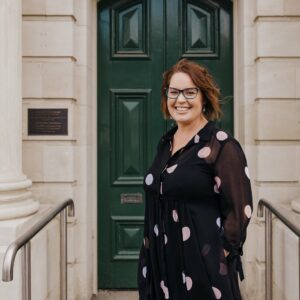
I’m in my mid-forties and I live with my husband, kids, and dogs in the small regional town of Ōamaru! I’ve been living with symptoms and episodes of multiple sclerosis (MS) for about 20 years, but I was only diagnosed in 2021. I love people and seeing them live the best life that is available to them. I’m slowly learning to apply that to myself, too.
Day-to-day, I keep pretty busy. I run a business called “Let’s Talk”, supporting productive conversation through mediation, restorative practices and communication coaching. Outside of paid employment, I have varied roles with local and national boards and organisations.
On top of that, I’m a Mum to three beautiful and ever-growing adolescent kiddos and a wife to one entrepreneurial and multi-project planning husband. Helping to keep them fed, watered and pointed in the right direction is a big time investment.
Creativity is at the centre of how I use my spare time. I love to create, mostly through music, writing and drawing. But I also love exploring the greater creation by car, bike or foot – solo or with any combination of family, friends and dogs!
I also value working toward a challenge in the outdoors. To stay active over the few years before my diagnosis, I trained for various events, including three rounds of Mud, Sweat and Tears – a 5km obstacle course through mud that you dress up for! In between, I trained for and completed three running events. I completed my first 10k race as part of the inaugural Queenstown marathon, all in the pouring rain. I remember thinking, ‘How do I get out of this?’. I answered myself, ‘Run faster’! I also completed the Buller Half Marathon.
However, in the time leading up to my diagnosis, my physical activity decreased, and I lost a lot of condition. I was seeking answers but getting none: I was sure that this level of fatigue, vision struggles and clumsiness was not ‘normal’.
What does it look like living with your diagnosis?
“I hope to learn more about my body’s capability and how to find workarounds for any limitations I experience. I want to live actively as long as possible.”
Living with MS is difficult. The most challenging aspects are the day-to-day unpredictability of symptoms and my fear of what my future might look like. However, I am now turning my focus to caring for my body. I intend to condition and nourish my body as best as I am able through the help of Mastering Mountains and the fantastic team at Movement Hub in Ōamaru. My physical and mental fitness took quite a blow with my diagnosis, and I’ll have to regain these to achieve my goal.
Focusing on my health, fitness, and well-being is a powerful tool in managing MS – both in minimising the likelihood of relapses and how my body can respond to any future disease progression. With specialist rehabilitative support and accountability, I hope to develop lifelong healthy habits and discipline to slow my disease progression and place equal value on all areas of my well-being: physical, emotional, spiritual and relational. When I think about these four areas of well-being, setting myself a challenge to work toward, like I used to, is exciting and empowering.
Tell us about your mission.
My goal is to walk The Old Ghost Road, an 85km trail in the Buller District – a journey that will take me five days.
In recent years, I have thought a lot about embarking on a pilgrimage. The concept of pilgrimage as a spiritual practice exists in almost every religious tradition. Travelling from one physical destination to another becomes an opportunity to intentionally encounter God through nature and creation. Sadly, hiking one of the Camino pilgrimages, for example, is not a viable option for me due to my current disease-modifying therapy (DMT) medication schedule.
As I read about the Ghost Road and how dedicated people laboured for years to create this walk across slips and through other obstacles, constructing bridges and steps, I made a parallel comparison to my central nervous system and the work it must do. Because of the lesions in my spine, my brain needs to create new neural pathways – neurological bridges, steps, and detours to keep a path open and enable me to continue walking. For this reason, I have chosen to walk the Old Ghost Road as a pilgrimage.
Preparing for my goal, I am excited about the opportunity to learn to trust and care for my body as I rely on it to carry me through my pilgrimage. Through the help of the Mastering Mountains Expedition Grant and the team at Movement Hub, I hope to learn more about my body’s capability and how to find workarounds for any limitations I experience. I want to live actively as long as possible.
If you could have a giant billboard with anything on it, what would it say and why?
I would want a billboard to say this:
“If we are to love our neighbour as ourselves, let’s learn to love ourselves well”.
Why? If our standard for caring for others is the standard of care we have for ourselves, then it makes sense to first invest in ourselves: that can only elevate our care for others 😊
We, the Mastering Mountains team, are thrilled to introduce Raffaela Dragani, one of two expedition grant recipients this year. We love the dedication she brings, and we are excited to support her as she strives for her goal. Below, we asked Raffaela a few questions, which she answered:
Tell us about yourself.
My name is Raffaela Dragani. I am 41 years young and hail from the Abruzzo region of Italy. My mum is German, hence I am scary organized; my dad is Italian, hence my passion and intensity. New Zealand has been my home since 2013, when I traveled to Marlborough to work in the wine industry. Little did I know I would meet my husband and relocate here for good.
My parents worked hard to share their love for the outdoors with me, taking me and my brother tramping from a very young age. Abruzzo is home to the highest peaks of the Apennines mountains and many national parks. Lots of my fondest memories are from hiking with Dad in Italy. Marlborough with the Richmond Ranges reminds me of these memories, making me feel less homesick. That’s why I love getting into the hills.
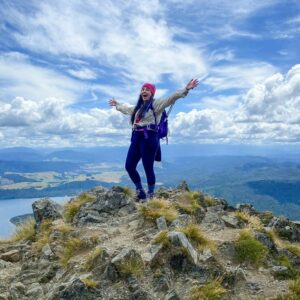
Then, in April 2020, right after a 40-day lockdown spent working from home, Functional Neurological Disorder (FND) reared its head. I developed tremors in my right hand and arm, and initially, we weren’t sure why. Because of COVID, it was hard to find a neurologist: it was not easy at the time to go through the health system. I finally saw a neurologist in June 2021 and received my diagnosis. I cried with relief at the time to know my brain was okay.
Getting diagnosed with FND also showed me how important representation is. I never heard about FND before my diagnosis. I am still scared and grieving, but knowing there is a community (like FND Hope and Mastering Mountains) makes a huge difference. I make a point to be open and honest with the people around me about my diagnosis so they learn about FND. I hope they can one day support someone else with FND in the future.
What does it look like living with your diagnosis?
I work as a QA Manager for a wine company, and I am lucky to have my employer’s full support. In some ways, my work life has not changed much since receiving the diagnosis. However, managing my FND requires me to work more from home, and my typing has slowed.
Unlike my work life, my personal life and how I use my spare time have changed significantly with FND. Big tramping adventures are currently out of reach. Because I haven’t been able to get out, I lost time with my tramping girlfriends, and we used to go out together, tramping regularly. I used to love journaling, but handwriting, more than a few brief sentences, is not an option anymore. My phone and dictation help a lot. I often feel sorely aware of my limits, and it hurts to have lost these outlets.
I try to stay active, working out on the mat, doing easy short walks, going to the pool, and working out at the gym with my trainer. I try to meditate daily. I’m getting better at resting when my body needs it, and I read lots of books.
Tell us about your mission.
I’ve wanted to reach Blue Lake in Nelson Lakes National Park for a long time. I was so excited because I was booked to be a hut warden there a few years ago, but I had to cancel because of my health. I felt so disappointed. Since then, I have always wanted to go, so I’ve chosen it as the goal I’ll work toward with Mastering Mountains.
I feel excited about my goal because tramping is a big part of who I am. With the support of Mastering Mountains, I want to reclaim that part of me from FND. The grant gives me access to the resources I need to get my body strong again. At the moment, my walking is bad. My right leg limps and shakes, my right ankle curls up, and sometimes I struggle to put my foot down all together. I can only walk a few kilometres at a time, and the trip to Blue Lake Hut will take a few days. They say the best way to train for tramping is to go tramping. My grant allows me to work with professionals, helping me get strong enough to walk on uneven terrain and carry a pack. Easy right?!?!
The journey ahead of me feels scary (what if I fail?) and mad exciting (what if I make it?) all jumbled up together.
If you could have a giant billboard with anything on it, what would it say and why?
I’d have two billboards with quotes that ring true and align with who I am and have been for many years.
The first would show Audrey Hepburn’s famous quote:
“I believe in pink. I believe that laughing is the best calorie burner. I believe in kissing, kissing a lot. I believe in being strong when everything seems to be going wrong. I believe that happy girls are the prettiest girls. I believe that tomorrow is another day, and I believe in miracles.”
My second billboard would display an Italian poem by Stefano Benni. My translation does not do this one justice at all:
“E per noi ogni giorno è prezioso.
E abbiamo i racconti.
E sappiamo riparare le cose, voi no.
E anche se il vento ci soffia contro, abbiamo sempre mangiato pane e tempesta, e passeremo anche questa.”
“And for us, each day is precious.
We have the stories.
We know how to fix things.
Even if the wind blows against us, we’ve always eaten bread and storm, and we will overcome it once more.”
We, the Mastering Mountains team, are thrilled to introduce Duncan Grant, one of three grant recipients this year. We love the passion and dedication he brings and we are excited to support him in his goal. Below, we asked him a few questions, which he answered:
Tell us about yourself.
Kia ora, my name is Duncan. I’m a 52-year-old passionate Manawatu local who happens to live in Auckland. I have two amazing daughters, Sophie and Lucy, in their final years of high school. I’ve been a teacher for 25 years and am currently the Director of Sport at a primary/intermediate school in Auckland.
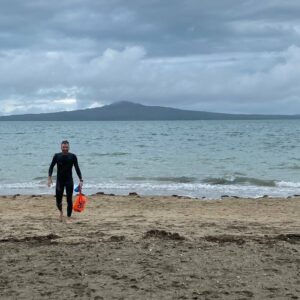
Growing up on a farm near Taihape, I’ve always been fit and active. In my 20s, on my “big OE”, I discovered Endurance Racing, long-distance running and adventures. When I moved to South Africa with my family in 2004, I continued racing and got involved in canoe marathons. In 2004, we moved back to New Zealand with our young girls, and family life and work took over my adventure-racing life. My family, my friends, my sport and my job are the cornerstones of my life.
In May of 2020 I decided to see a doctor to get to the bottom of the ongoing knee pain I’d experienced. In addition to so many other things, COVID had meant a lot of “home gym” time, and I found my hamstrings tight and painful. The doctor referred me to a spinal surgeon. At the time, I didn’t appreciate why this might be. Weirdly, instead of performing some sort of knee examination, he referred me for a full MRI. Three weeks later, he called with the results. In his opinion, my MRI showed signs of spinal and brain lesions, most likely indications of multiple sclerosis. This July is the 3rd anniversary of my diagnosis of a disease I believe I have probably had for a much longer time.
Day-to-day, I work full time as Director of Sport, which I love, but this does keep me very busy. It’s a job which is a mix of administration (office duties) and organisation (dealing with kids and parents, sports people & venues). I’m a parent – and that means lots of ubering, catering, washing and general support services to two busy young women. I try to prioritise exercise each day, ocean or pool swimming, walking or on my Concept home rower. Some days I am just tired, so I will rest at home for the afternoon. Most evenings, you will find me on the couch as days are exhausting, especially with the extra fatigue I get with the MS.
People continually ask me why I am limping, assuming it’s a sports injury. My left leg foot drop means I drag that leg; if I’m tired, the drag is worse. It’s hard to know what to say without telling my whole life story but also remaining true to my reality of living with MS.
I did have another physical symptom written here, but actually, the biggest challenge for me on a day-to-day basis is the mind game. My mind plays tricks on me, often depending on fatigue, what else is happening in life or how busy I am. Reminding myself to take each day at a time: not catastrophising or overplaying my disability is the hardest thing for me. Similarly, reminding myself that it’s OK to be tired and that I can’t do everything is tough.
Learning to be vulnerable is something I didn’t expect when I was diagnosed with a chronic illness. Through my diagnosis, treatment and journey to date, I have come to appreciate the strength of being vulnerable, the superpower inherent in letting down your armour. Recently, I spoke at my workplace about my diagnosis and what it means to have MS. This semi-public acknowledgement was a tangible demonstration of the change in my mindset since diagnosis.
Tell us about your mission.
My goal is to swim from Rangitoto to St Heliers, a distance of 4.6km. I will swim it twice, once in November 2023 in the Ocean Swim Series and again in April 2024 in the Auckland Central Master’s race. I chose this challenge as I love the ocean and the ocean swimming community. I had participated in these races before my diagnosis, and I wasn’t sure I could ever do them again. In choosing to swim them, I want to prove to myself that my disease doesn’t define me. And I want to show others what they can achieve with support and determination.
The thing that makes me most excited (or maybe scited: scared and excited) is the journey. It’s a long way from Rangitoto to St Heliers in the ocean. I have left-side weakness, especially in my left leg. This worsens with more extended periods of exercise and can be triggered by changes in temperature and stress. MS has reduced my average ocean swim distance from 3.5km to 2km. The Rangitoto Swim is 4.6km, so this is a stretch goal for me. It will be a challenge and one I’m not sure I can achieve, but I’m excited to push myself.
Fortunately, these two races have lots of on-water support and safety in the event if I do find the distance too far. I’ll also swim with friends from my swim group on either side of me to ensure I don’t overestimate how I am tracking.
For me, there’s the bigger purpose of my mission: to show others that there is hope and a pathway to being an active person with MS. The community I have around me, in my swimming community, my MS groups, my friends and family are the ones who give me this hope. I want to offer my story to others at the start of their journey or those looking for a change of approach part way along.
What I am constantly striving to change is the mindset, in myself and others, that a diagnosis of MS is not the end. Through my challenge, I want to show that it is not: with the right mindset, medication, support, and health and wellbeing plan, diagnosis can be just the beginning.
If you could have a giant billboard with anything on it, what would it say and why?
”If you don’t like the road you are walking, start paving another one”.
People will tell me they are so sorry when they learn I have MS. I’d also like to tell people that there’s no need to apologise: it’s not your fault! In many ways, MS has been a gift to me. It has taught me so much about myself that I would never have discovered. So, no need to apologise for my superpowers.
David Kyle, a father of four from Upper Hutt is the 2022 recipient of Mastering Mountains Grant. David’s mindset and objective are inspirational. At Mastering Mountains, our goal is to enable people with MS and functional neurological disorder to get outdoors, achieve their goals and experience positive, life-long change. We were impressed with David’s determination to develop the skills, strength and stamina needed to complete the challenging 20 km Karapoti Classic mountain bike race and to continue cycling with friends and family long into the future.
Cycling has been a big part of David’s life. David, who keeps busy raising four kids under the age of eight with his wife Mikola, works for a German med-tech company and was diagnosed with MS two years ago. Before his diagnosis, David did a large amount of road cycling and mountain biking, including long-distance races. Additionally, David regularly participated in group cycling and mountain biking with friends; it was an essential community.
However, David’s MS symptoms interfere with his ability to get out and participate in his cycling community. Leg weakness and difficulties with heat management make it hard to get out on his bike – and he finds the limitations frustrating. David explains: “It’s impossible to keep up with my MTB mates on a long climb when we go out for a ride, where my left leg basically becomes a dead weight.”
More significantly, David’s eldest loves cycling, and David’s MS limits his ability to participate in the sport with him. “My 8-year-old is also a keen mountain biker, and I hope I can keep riding with him as he gets older and faster.” The Mastering Mountains team believes there is tremendous value in being able to enjoy the outdoors with family. For this reason, we are committed to helping secure this future for David and his family.
Mastering Mountains will pay for nine months of weekly training sessions with a specialist coach. We believe that the mental skills and symptom-management strategies David will learn, in addition to the physical training, will enable him to achieve his goal and enjoy cycling long into the future. We are also contributing to the costs of an electric mountain bike, empowering him to keep up with his mates during those long ascents in the hills above Upper Hutt.
MitoQ, our generous partner, has also given David a nine-month supply of MitoQ Pure, providing him with more energy and speeding his recovery after training. We will also supply David with up to $500 of gear from Macpac, our preferred outdoor supplier.
We are excited about David’s mission to complete the Karapoti Classic and how this will inspire the wider community. His determination to push back on his MS through rehabilitation and lifestyle is exemplary. David wants to be in control of his MS “rather than the other way around” and to address “people’s stigma and lack of knowledge around MS – [to show that people with MS] can still be active and push through symptoms to achieve physical goals.” Article written by Nick Allen, Mastering Mountains.
Last year I was the successful recipient of the Mastering Mountains Grant for people with FND and MS. My objective was to climb a 3,000m peak the Southern Alps. When I first submitted my application for the Grant I had no idea of what my body was capable of. I had been diagnosed with MS just a year and a half earlier and I was still figuring it all out.
Prior to my diagnosis I had been an avid tramper and alpine climber. Although my activities had reduced a little with the arrival of my daughter, I was still managing to squeeze in a few good adventures each year. However since my diagnosis the longest walk I had completed was a 3 hour saunter with a light day pack. So the goal to climb a 3,000m peak was definitely a ‘stetch target’! When I heard I was the successful recipient of the Grant I began to worry I had over-committed. But there’s nothing like a goal to get me motivated.
I began by connecting with a neuro-physio, who put together a training programme. We worked through a range of strengthening exercises and I started to build my cardio endurance. Starting with short hill walks I progressed to longer days, overnight tramps and eventually some alpine trips.

Imagine; you are watching your family and grandchildren excitedly getting ready to leave for a stunning new walk, one that you would love to go on, your grandchildren say excitedly, “Nanny, do you want to come with us?” Instead of replying, yes, you have to say “Sorry, Nanny’s legs don’t work properly,” and wave goodbye. For 2017 Mastering Mountains Grant recipient Michelle Gerrits, this was her reality. But not anymore.
Michelle was awarded one of the 2017 Mastering Mountains Grants, which has been used to obtain an Alinker Bike. Her aim, to complete a nine km section of the Great River Ride, from Ngaruawahia to Horotiu, with her family and grandchildren. The Alinker bike is a “non-motorised, walking bike with no pedals”, designed specifically to support the user and enable him or her to stay balanced and comfortable while exercising. In addition to the Alinker Bike, Michelle was also given MitoQ Serum and Suppliements to help rebuild and support her system, as well as specialised clothing from Macpac to help keep her keep cool and comfortable when training.
When talking with Michelle, you immediately sense a warm bubbly personality; someone who is determined not to let her MS stop her from doing things that she values the most. Her greatest motivation comes from her family, wanting to make memories with them — her grandchildren in particular.
Since being diagnosed five years ago, Michelle has suffered from severe numbness, tingling, balance and mobility issues. She finds work and social occasions hard: “I have to sit down as I can’t stand for long periods of time. Sometimes it is hard to mix and mingle.” However, one of the hardest things she has to deal with was not being able to keep up with her grandchildren or work on her lifestyle block.
Michelle believes that one of the best things she can do is to be proactive. “Don’t give up,” she says, “try and try again.” That’s why she’s focusing on building the strength and stamina she needs to go the distance and achieve her goal.
We asked her why she wanted to do this section of the Great River Ride. Her family has already done part of the track and her grandchildren constantly ask, “Nanny do you want to come with us.” She has to explain, “sorry, Nanny’s legs don’t work properly.” This makes her feel bad but also provides her with the motivation she needs: “now that I have the Alinker Bike, not only can I do the track with my family and grandchildren, but I can join them in doing so much more”.
The gift of the Alinker bike means that Michelle is no longer confined by distance and disability. The possibility of doing more and getting active has not only improved her physical wellbeing, but her outlook on life has brightened as well.
Michelle described how “disheartened”, she felt when she was first diagnosed, especially when thinking about the future, but now, she has a firm belief: “Don’t let the bad times get you down!” She is excited about the future and determined to complete the Ngaruawahia to Horotiu trail in the coming months. We look forward to watching her progress and hearing about all the new adventures she will be having thanks to the Mastering Mountains Grant, Macpac and MitoQ.
(Written by Mastering Mountains)
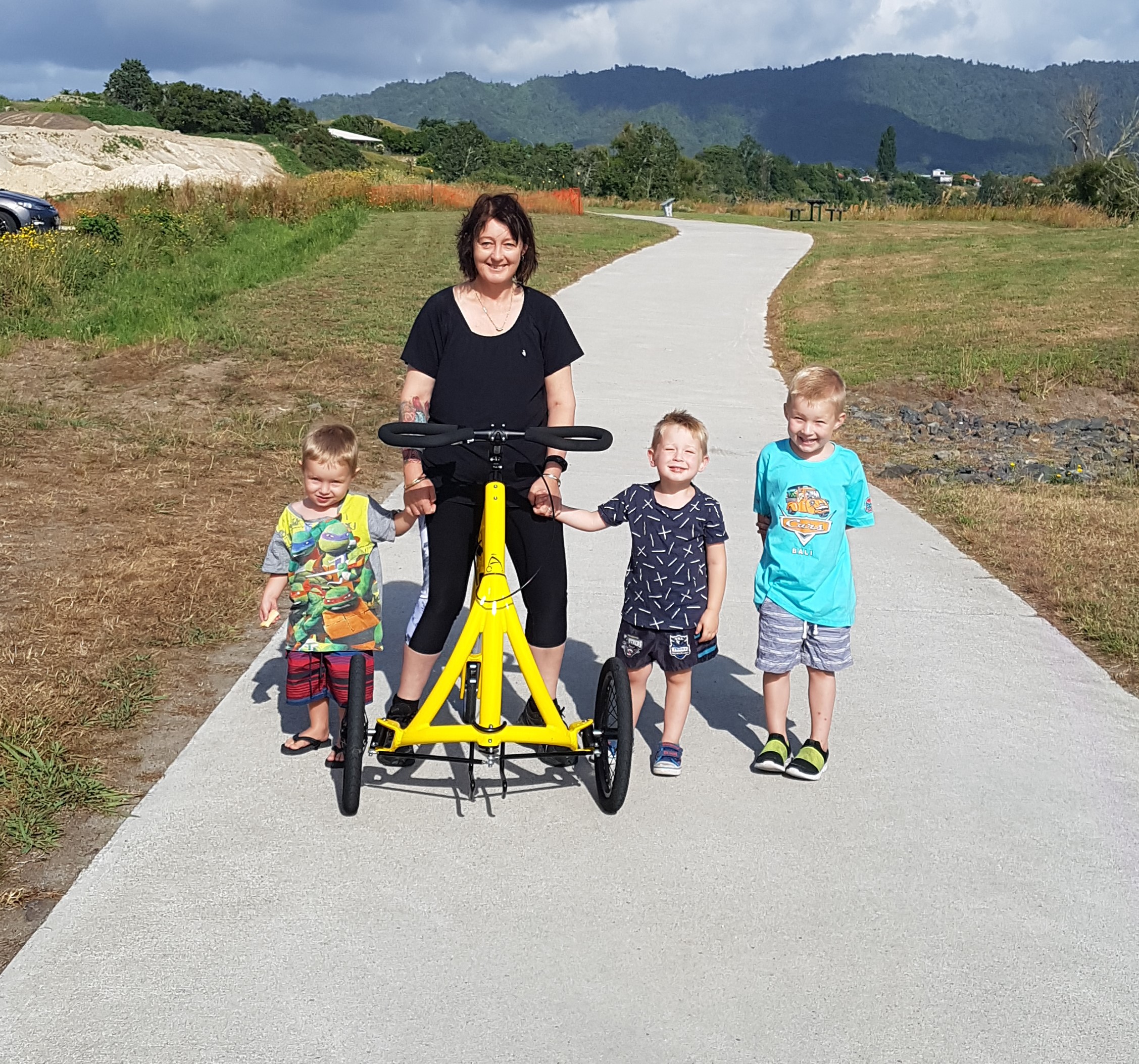
For Marlene Hessing, the diagnosis of Multiple Sclerosis originally meant no cure and no medicines. She was told it would only get worse and that she would end up in a wheelchair. She proved them wrong.
Now, almost 20 years later, Marlene has taken control of her MS and is determined and strong. She has left her wheelchair behind and after a time with a trolly and cane, she now walks unaided. Even though she still finds walking and balancing a challenge, she doesn’t want it to stop her from achieving her goals. Marlene is set on achieving the levels of strength and fitness she needs to complete the Goat Island Walkway (2 hour rounds trip) and Tiritiri Mantangi Island Walk ( 2 hour walk) with the help of Parkinson’s Counter Punch and MitoQ.
Marlene describes herself as a “warm, strong and independent lady who puts effort into everything I commit to — a survivor I guess.” And a survivor she is. Originally diagnosed with Relapsing Remitting MS in 1999, she was rediagnosed a few years later with Secondary Progessive MS. This meant that she had resign from her full-time job with Air New Zealand, having worked for them for more than 15 years. The advancement in her MS caused significant disability and although it was extremely hard at times, both physically and mentally, she was determined to fight back and not let MS win.
“Walking is person’s best medicine”, she explains, “its good for body and mind and I was a member of the Outdoors club at Air New Zealand. [I] loved spending time in the outdoors and with the other members”. Her love of walking and her fierce determination to stay out of the wheelchair takes her to the gym three times a week and keeps her going to the Yoga and Water Walking classes provided by MS Auckland. After four years of training and experiencing improvement, she now concentrates on working hard to regain her mobility, balance and gait.
“I knew that if I trained with a professional, they would help me to be consciously aware of using the correct technique while improving my gait, posture, arm movements, weight transferring and everything else that goes with safe and correct walking. I have lost these skills and need to retrain.
“It would mean the world to me to get back some fitness and participate again in walks and treks, especially in the bush. This is the best chance to beat the progression of MS”.
With help from Mastering Mountains grant, Marlene is receiving one on one personal training sessions with Counter Punch Parkinson’s to help her build her strength, balance, coordination and stamina in order for her to achieve her goals. Counter Punch Parkinson’s is a rehabilitation service designed for people with neurological conditions.
Reflecting on everything that has got her to this point, Marlene believes that the most important thing is to share your journey, stay hopeful and not look at worst case scenarios. Looking ahead, she believes that persevering with a positive attitude will keep her strong and positive, “No time is better than now.”
We wish her all the best and look forward to watching her progress and completing her goals.
(Written by Mastering Mountains)
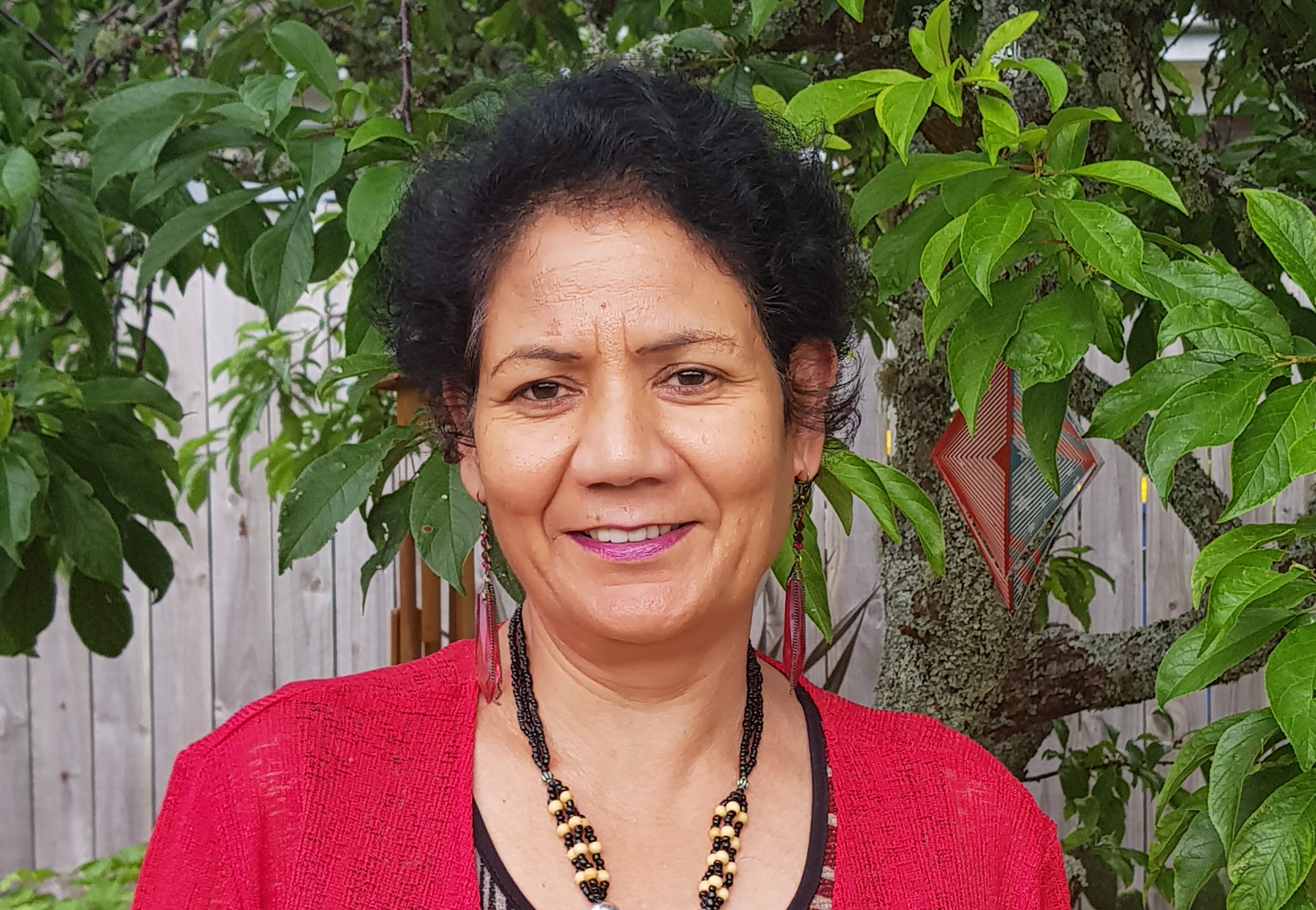
The inaugural Grant was awarded in November 2016 to fund a personal trainer to help Sue achieve her dream of tramping over the Maungatautari Mountain. The 11km track has a 500m ascent which Sue estimated would take five hours to complete. “It’s a big mission! My MS and my current lack of fitness are the only reasons I have not yet done this,” said Sue when applying.
Sue works as the Administration Manager at the Maungatautari Ecological Island Trust in Pukeatua. “I love the role and I often get called into the Visitor Center, where I talk with visitors and tell them about the sanctuary and its tracks. The only problem is that I had to rely on second-hand information.”
The Panel were encouraged by Sue’s determination and reasons for wanting to complete this challenge; “I am looking forward to that feeling of achieving something that is out of reach with the support and encouragement of others. To me, it’s also really important to make memories with my young daughter. She is very active and I want to be able to participate in outdoor activities with her. Walking over Mt Maungatautari will help me achieve this and I believe that it will set me up for future adventures.”
Sue initially struggled with the additional exercise, thinking she never be fit enough. However, she soon overcame her initial fears and was off to a flying start managing to treble the amount of daily walking, building in daily bush walks at work and going to the gym once a week. “Every morning before I start work, my boss lets me go for a power walk for 35 minutes on the mountain tracks, I also climb the 16m tower three times a week, if not 4, which is 91 steps.” Despite an injury mid-way she was soon back on track with a renewed determination planning base to mountain peak training walks.
“Thanks to the personal training and regular exercise I am much fitter, my balance has improved and I have so much more confidence in myself, to not only get out more, and by myself, but also confidence that I can achieve this goal I have set myself.” Sue set herself a second challenge to lose 10kgs. “I started training and following the Overcoming MS diet in early January. Boy, does it feel good having shed those extra pounds and I feel much healthier.”
Before the walk, Sue admitted, “I am a little scared but very excited – scared as I know it will be no mean feat with my MS, but excited that I have every chance of achieving my goal due to all the support I have been given to get me there!”
Sue’s challenge took place on the 24th September 2017. “It was amazing, I was nervous as anything, however excited that the day had finally come.” Sue was supported by a team of 21 including staff from MS Waikato, other PwMS, her personal trainer, colleagues, Maungatautari Trust volunteers, friends and even a surprise visit from her Neurologist.
“I must admit the first two hours were hard going, steep uphill rises, however with such a big support group, encouragement and laughter we made it to the top of Maungatautari.” Following a lunch stop in the saddle, enjoying the rare birdlife and views, they reached the Visitors Centre where staff and Trustees had tea, a dairy free birthday cake and flowers waiting.
“I walked down the final slope towards the Visitors Centre to clapping and cheering. I was elated and overwhelmed with my achievement, thankful for the support I had from so many people and to be surrounded by such positivity. I inspired a few PwMS to do the walk with me and they achieved their goal too, an awesome effort! I feel honoured to have inspired others to push past MS and kick MS in the butt and say I can do this even with MS. MS may slow me down but it will not stop me! We all achieved something. I was smiling all the way and I am still smiling. I achieved. I met my goal. I lived my dream.”
“A huge thanks to the support I received from the Mastering Mountains Grant, sponsors, my trainer, friends and family. It would not have been possible without such amazing support.”
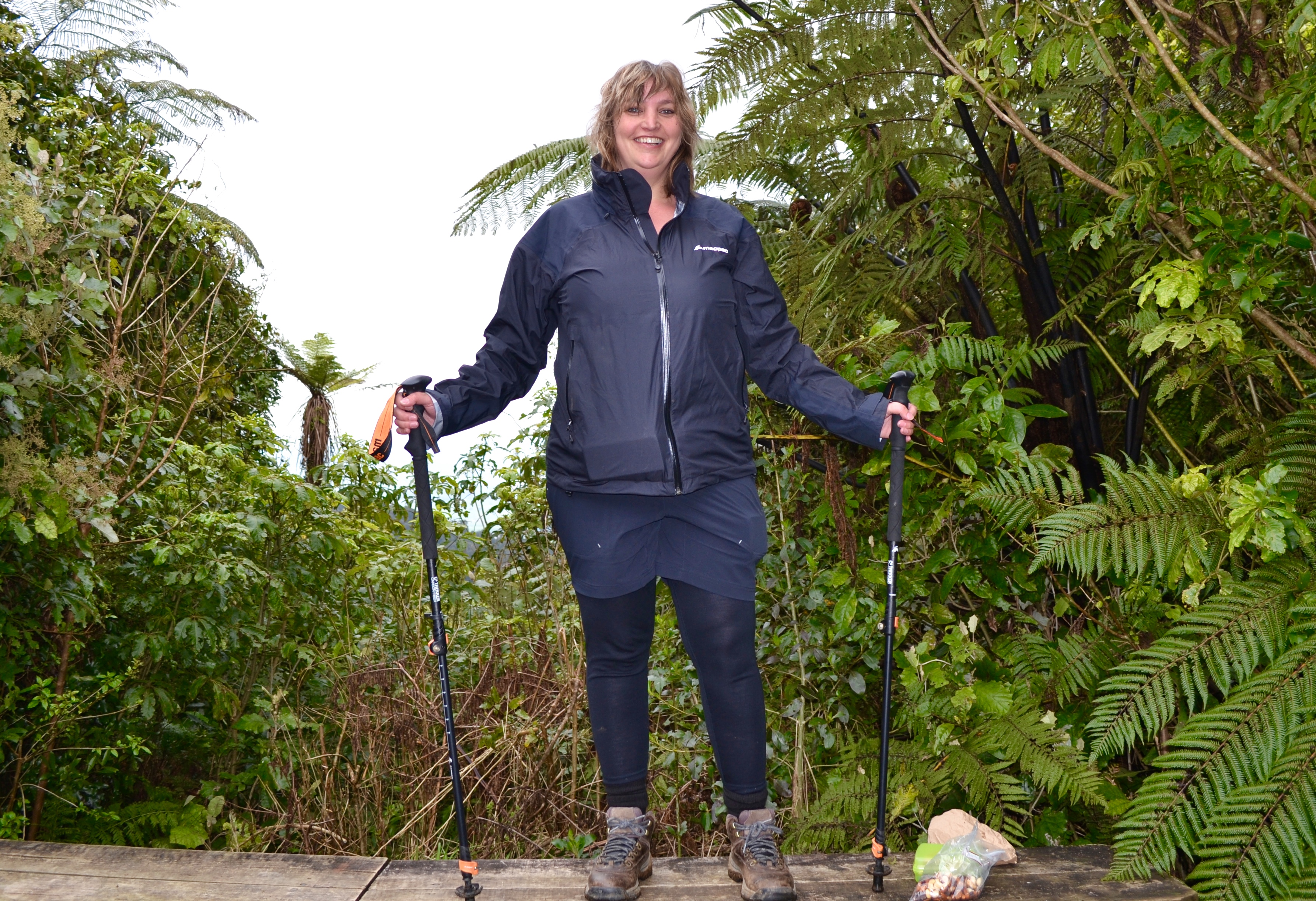
For your chance to apply for a Mastering Mountains Grant to achieve your outdoors goal see our Grants Page for more information